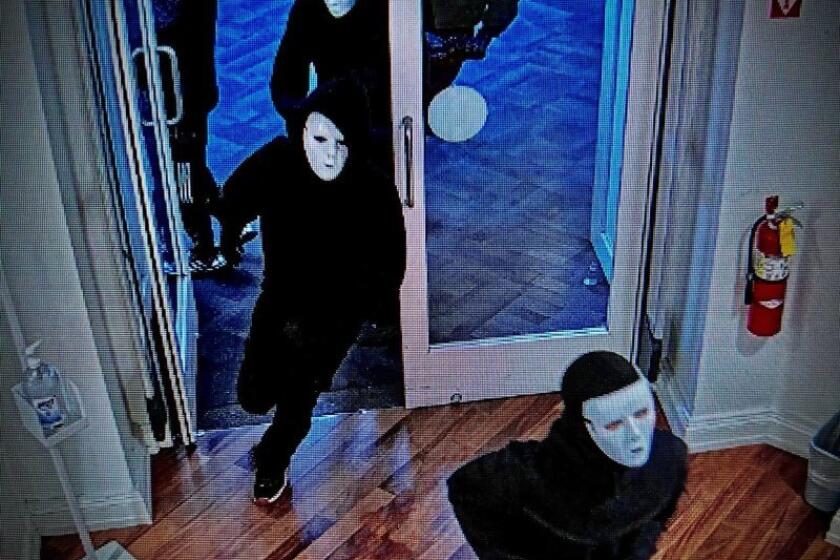Court Voids Curbs on Searches of Parolees’ Homes
The California Supreme Court, overturning a 1986 ruling, decided Monday to give police broad freedom to search the homes of parolees.
The court voted 4 to 3 that parolees and their homes can be searched without warrants even if police have no reason to suspect a crime or problem. The court majority said it was trying to protect the public, but three justices complained that the court went too far.
“Government officials may now search private homes in neighborhoods throughout the state, by day or by night, for any reason or for no reason, if one of the home’s residents is a parolee. . . “ Justice Joyce L. Kennard wrote in a separate opinion.
There are about 109,000 parolees in California.
Defense attorneys predicted that the ruling would invite police abuse. “This opens the door for suspicionless, groundless searches not only of parolees but people who live with them,” said defense attorney William J. Arzbaecher III, who will ask the U.S. Supreme Court to review the decision.
The California Supreme Court, under former Chief Justice Rose Elizabeth Bird, unanimously held in 1986 that ex-convicts who had served prison time for felonies could not be searched unless authorities had a reasonable suspicion that a law or parole condition had been violated.
But Justice Janice Rogers Brown, writing for the court Monday, said a parolee has only conditional freedom, “granted for the specific purpose of monitoring his transition from inmate to free citizen,” and limited expectations of privacy.
“The purpose of the search condition is to deter the commission of crimes and to protect the public,” Brown wrote, “and the effectiveness of the deterrent is enhanced by the potential for random searches.”
Searches of parolees will be deemed reasonable as long as they are not “arbitrary, capricious or harassing,” Brown said. Defense attorneys said it is virtually impossible to prove that a search was arbitrary or harassing.
Chief Justice Ronald M. George and Justices Marvin R. Baxter and Ming W. Chin joined Brown in ruling against Rudolfo Reyes, who was on parole in 1995 after serving time for a robbery when police found a small amount of methamphetamine in a shed in his Tulare County backyard. Police searched the shed after Reyes’ parole agent received an anonymous tip about drug use.
A trial court ruled that the search was legal, but a Court of Appeal said the evidence of drugs should have been suppressed because there was no reasonable suspicion behind the search.
The Supreme Court was unanimous in holding that the search was legal, but Justices Kennard, Stanley Mosk and Kathryn Mickle Werdegar said the 1986 standard requiring reasonable suspicion should be maintained. They said the search of Reyes met that standard.
Kennard said the vast majority of courts nationwide that have considered the 4th Amendment rights of parolees have agreed that warrantless searches must be based on reasonable suspicion. The state Supreme Court majority will now permit “virtually unrestricted searches” of parolees, she said.
“I decline to join the majority in adopting a rule that recognizes no distinction between a private home occupied by a parolee and a prison cell, and that authorizes warrantless, suspicionless searches of private homes,” wrote Kennard, who was joined by Mosk.
Werdegar also criticized the majority for “reducing the privacy rights of an adult who is attempting to rejoin the law-abiding public and rebuild his or her life, essentially to that of an inmate in prison.”
Stephen B. Elrick, who represented a state association of public defenders, called the decision an “outrage” and said “there is no question” that the ruling will spur unreasonable police searches. “I guarantee you that in 98% or 99% of contacts between a parolee and a cop, the cop is going to search the parolee just because he can,” Elrick said.
Deputy Atty. Gen. Joel Carey, whose office argued the case before the Supreme Court, praised the decision for bringing more consistency to the criminal justice system. He noted that adults and juveniles who are on probation already face random searches. Offenders given probation agree to certain conditions such as random searches in lieu of serving time.
“There certainly will be more searches of parolees,” he said, but he added that public safety will improve because parolees are “a substantial part of the recidivist problem.”
More to Read
Start your day right
Sign up for Essential California for news, features and recommendations from the L.A. Times and beyond in your inbox six days a week.
You may occasionally receive promotional content from the Los Angeles Times.







